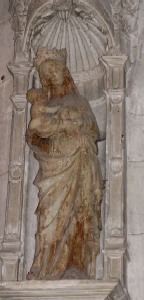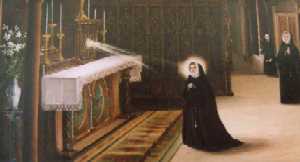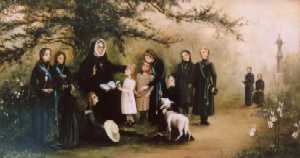|
Find out more about… …Some of the joys in her life |
 The statue of
the Virgin of the Smile (XIIIth century) was witness to Sophie's joys in early childhood,
as well as to the terrors of that time.
The statue of
the Virgin of the Smile (XIIIth century) was witness to Sophie's joys in early childhood,
as well as to the terrors of that time.
A. The joys of her intellectual formation.
During one short pause in theses studies at home, Sophie broke her heart laughing when reading aloud to her family the exploits of Don Quixote. She was reading from the original version.
For her brother, philosopher and teacher of mathematics at the college in Joigny, allowed the study of modern languages, Spanish and Italian, only by way of relaxation. Study was for word; not for enjoyment. But ancient literature spoke much to Sophie, who confessed many years later that in her youth she had been more virgilian than christian.
This wide knowledge which was imposed upon her, proved very useful when devising the plan of studies for the boarders, even if the young women educated at the sacred Heart did not attain to her level intellectually. Rather than becoming very learned, the became good Christians, witnessing to this in their family and social life.
B. The joy of her mysticism
Yes, it is apt to use that word from the very start. From the earliest years of her spiritual life, Sophie delighted in God. The day of her final profession in Amiens in 1802, they searched everywhere for her. Where was she ? It was time to go to the chapel. Finally she was found lost in God under the hazel tree in the courtyard, and it was no easy matter to bring her out of her ecstasy.
 When she was drawing up the
constitutions she worked with Father Varin in Switzerland. At one meal-time,
she was nowhere to be found. The hostess, who knew her, sent a young boy to the
chapel. There was Mother Barat in the darkness, a dark form on the tiled floor.
She was lost in God, and it was difficult to get her attention. Prayer was for
her relaxation and her very breath, her way of finding renewed energy in her so
very busy life. The time she let slip the fact that she prayed 6 or 8 hours a
day, she hastened to add, as if by way of excuse: "You see, I sleep very
badly."
When she was drawing up the
constitutions she worked with Father Varin in Switzerland. At one meal-time,
she was nowhere to be found. The hostess, who knew her, sent a young boy to the
chapel. There was Mother Barat in the darkness, a dark form on the tiled floor.
She was lost in God, and it was difficult to get her attention. Prayer was for
her relaxation and her very breath, her way of finding renewed energy in her so
very busy life. The time she let slip the fact that she prayed 6 or 8 hours a
day, she hastened to add, as if by way of excuse: "You see, I sleep very
badly."
She lived the liturgical year with its succession of feasts and celebrations of the stages of the life of Jesus - stages of our salvation - giving herself totally to all that these "mysteries" hold for us, filled as they are with meaning and with grace. But the time she especially loved was Christmas, when the Most High became tiny, out of love for us. She celebrated this liturgical time with great tenderness, decorating the Infant's crib with flowers and spontaneous offerings of love. She had received her love of the Heart of Jesus from her mother. During the terrible years when devotion to the Sacred Heart and politics were closely linked -remember the massacres in the Vendée of those whore wore badges of the Sacred Heart- Madame Barat gave pride and place in the house to the picture of the Sacred Heart. This, despite the unease of her family whose beliefs were strongly influenced by the prevailing Jansenism.
The Holy Spirit, "the soul's delight" was her constant point of reference, the yard-stick of all her thoughts and actions. Her writings on the Holy Spirit, in particular a conference she gave to the community in Paris on Pentecost Monday 1827, are still a source of inspiration today. In describing the happiness of a soul totally given over to the Holy Spirit, she was surely describing herself.
C. The joy of friendship
She had so many friends among her daughters that it is hard to choose out any one in particular. So here we will name only a few friends - not from within the congregation - but people whose friendship never failed her, even in very trying times.
Monsignor Mathieu, Archbishop of Besançon, was the mediator between Rome, the bishops in France and the French government, during the crisis of 1839-1842, which almost destroyed the Society. Former confessor of the community in Paris, he had Mother Barat's full trust. For his part, he had such regard for her that he was prepared to put his own well-being at risk for her sake. This is a friend who wrote to her:" Allow me in sharing your cross, to share something of its weight." His complete dedication in face of the diplomatic manoeuvrings , his wise advice, his prayer, all these contributed in no small way to saving the Society in 1843.
Monsieur Récamier, doctor for the community in Paris, did not hide his respect for Madeleine-Sophie whom he looked after many times. He said of her that she had the gift of making and keeping close friendships. He was filled with concern for her and knew her real affection for Sister Marie. The latter was devoted to Madeleine-Sophie, but somewhat rough in her manner. Realising the Sister Marie was ill and would soon die, he discreetly suggested that Mother Barat be asked to leave the house without her being told why. She was sent to Bourges to spare her the pain of this death; nonetheless, she wept much when she heard her friend was dead.
The day that she heard of Monsieur Récamier's death in 1854, she sent the messenger away saying : "Pharaoh gave Joseph 30 days to weep over the death of his father Jacob. Il will take 24 hours to mourn for this holy friend of the Society."
D. Joys while travelling...
While she was very happy to have these joys, she did not stop to savour them. There was too much work awaiting her, everywhere.
 Among her greatest joys, was the trust afforded her by the little
girls in Paris. She called herself their Mistress General. "I need the
children", she used to say to Mother Perdrau, when she wanted to meet them
in the garden. There she taught them, she spoilt them, she got them to speak of
their relationship with God. A little basket has been kept, which she used for
collecting apples for the children. One day, from above on the stairs, she
witnessed a scene which amused her. A file of children, with a teacher at the
front, was going past a tray of tempting iced-cakes. Very quickly, the cakes
had the mark of little tongues which had licked off the icing… and it was
the thoughtless teacher who was scolded.
Among her greatest joys, was the trust afforded her by the little
girls in Paris. She called herself their Mistress General. "I need the
children", she used to say to Mother Perdrau, when she wanted to meet them
in the garden. There she taught them, she spoilt them, she got them to speak of
their relationship with God. A little basket has been kept, which she used for
collecting apples for the children. One day, from above on the stairs, she
witnessed a scene which amused her. A file of children, with a teacher at the
front, was going past a tray of tempting iced-cakes. Very quickly, the cakes
had the mark of little tongues which had licked off the icing… and it was
the thoughtless teacher who was scolded.
What can be said about her love for the animals who always found their way to her ? The dog at the Villa Lante made its may right across Rome to find her at the Trinitá dei Monti and came back home empty-handed and disappointed. A cat hid her litter of kittens under Madeleine-Sophie's bed, to save them from being destroyed. Even after her death, Saint Madeleine-Sophie answered the prayers of pilgrims in Jette who came to intercede with her for their four-legged friends.
This short and necessarily brief series of articles does not allow space for many more testimonies of her friendships - particularly those with her daughters. She never turned in on herself to enjoy them, but only marvelled that so many religious wanted to belong to her community.
Last update: 2005-02-27